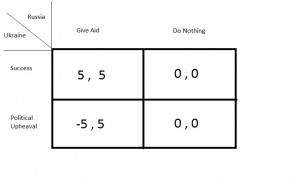Game Theory in the Crimean Crisis
In this article, Daniel Altman discusses the game theory behind Vladimir Putin’s decisions regarding Crimea earlier in 2014. Putin uses game theory as a tool to consider his opponent’s dominant strategy and only pursues ideas in which he cannot lose. In an attempt to increase Russia’s sphere of influence, or physical empire, Putin began by manipulating Ukraine. Russia offered much-needed financial aid to Ukraine, knowing full well that there was a chance that this would lead to political upheaval, and that the pro-Russian president would absolutely accept. The following grid displays the possible outcomes of Russia’s offer.
If Russia does not extend aid, nothing happens in either circumstance. If Russia extends aid and Ukraine accepts peacefully, Ukraine gets five points from aid, and Putin has just added Ukraine into Russia’s sphere of influence receiving five points. If Ukraine accepts and the political action leads to social turmoil from dealing with Russia, Ukraine loses five points and Russia still gains five, as Ukraine is now primed for military involvement. Clearly, Russia’s dominant strategy here is to offer aid to Ukraine—Russia gets five points no matter what happens in Ukraine.
If political turmoil ensues, Russia can find a way to invade Crimea and the world turns to NATO to respond. Another grid can be used to model Russia’s decision about whether or not to back up their threats, and NATO is forced to respond passively or aggressively.
If Russia follows through with their military actions and NATO responds in full force, then World War III could break out, and both sides lose fifteen points. If Russia responds aggressively and NATO responds passively, Russia adds Crimea and gets five points, NATO gets zero. If NATO commits troops and tries to call Russia’s bluff, Putin backs out and Russia doesn’t get any points, NATO receives two for defusing the crisis, but they also had to commit manpower and resources. Finally, if NATO thinks Russia is bluffing, and Russia does not act aggressively, NATO earns five points for a peaceful revolution and Russia gets nothing. It turns out, that no matter what decision Russia makes, NATO’s dominant strategy is to respond passively. Putin is aware of this, and therefore acts aggressively, as it results in the best outcome for Russia, five points from the addition of Crimea to his empire.
According to author Daniel Altman, “[Vladimir] Putin only plays games that he knows he can win”. Putin ran through each potential outcome and chose a strategy that he knew could not possibly result negatively. Using the reasoning of game theory, Putin destabilized Ukraine and seized Crimea.
http://www.foreignpolicy.com/articles/2014/04/08/you_cant_beat_putin_because_hes_already_won


